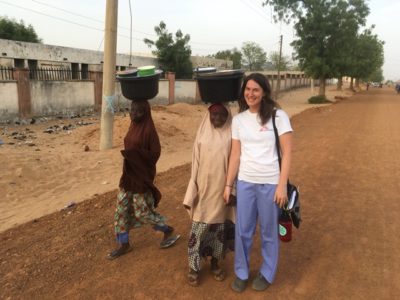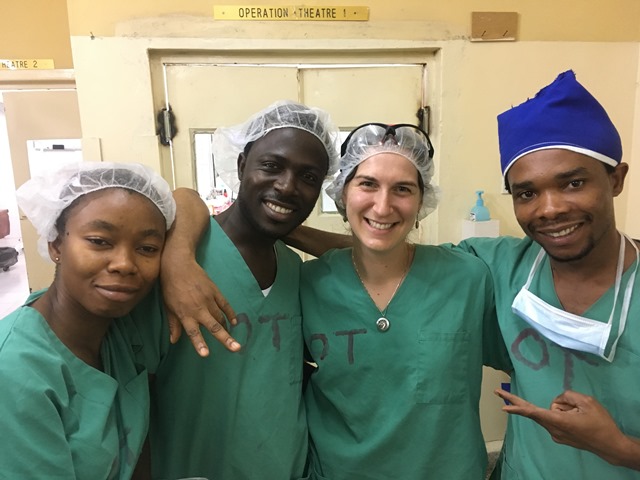By Dr. Heather Gottlieb
After an eight-hour drive from the Nigerian capital of Abuja in a Land Cruiser packed full with medical equipment we finally arrived. The sturdy iron gates to the compound opened and I was greeted with smiles: “Welcome to Jahun Paradise!”
It was hot and dry under the late day desert sun with temperatures still soaring above 40 degrees. The gentle warm breeze was welcome, but then the wind picked up and sent fine sand particles into suspension, leaving me temporarily blinded and with a granular sensation in my mouth.
Jahun, a small northern village in one of Nigeria’s poorest regions, was my home for a six week mission while working with Medecins Sans Frontieres (MSF) / Doctors Without Borders as an Obstetrician/Gynecologist. The project, which initially focused on treatment of obstetric fistulas – a tragic and preventable complication of obstructed labour – has since broadened to include comprehensive emergency obstetric care.
This was my second placement with MSF after a first mission in Pakistan. I knew that the assignment in Jahun would be challenging but I could never have anticipated the overwhelming volume and complexity of the patient population that we would treat daily.
There was a constant stream of patients with upwards of 1000 consultations and 800 deliveries every month. One busy morning I recorded treating three eclamptic patients, two patients with massive antepartum haemorrhages due to large placental abruptions, and a severely anemic antepartum patient who arrived gasping for air with a haemoglobin of 24 g/L (yes, 24, not a typo). Within minutes of each other an antepartum patient arrived in heart failure, a patient was whisked to the OR for an urgent C-section, and we had a triplet vaginal delivery. Then there were all the other less acute patients. And all this before lunch!
We always started our day with rounds in the intensive care unit (ICU). The ICU in Jahun was little more than a normal ward where the sickest of our patients could be better monitored with the simple equipment we had. It was not uncommon for me to do a quick visual scan of the patients in the ICU in the morning and realize a patient from the previous evening was no longer there. Most times it would be because the patient had improved and was transferred to the “annex”, the large and crowded general OBGYN ward. Other times it was because the patient had passed away overnight.
 Dealing with sickness and death in any context is never easy. As an obstetrician in Canada, my work centres mostly around happy outcomes. The death of a pregnant woman or a new mother is extremely rare in the developed world. Unfortunately, the odds are worse in places like Nigeria where the World Health Organization (WHO, 2015) estimates the maternal mortality ratio to be 814 per 100,000 live births, over one hundred times that of Canada, and fourth highest in the world.
Dealing with sickness and death in any context is never easy. As an obstetrician in Canada, my work centres mostly around happy outcomes. The death of a pregnant woman or a new mother is extremely rare in the developed world. Unfortunately, the odds are worse in places like Nigeria where the World Health Organization (WHO, 2015) estimates the maternal mortality ratio to be 814 per 100,000 live births, over one hundred times that of Canada, and fourth highest in the world.
Often times there are many obstacles for patients to overcome to obtain care, including great distances, insufficient funds for travel, or a lack of permission from their husband. Cultural factors and local customs, such as the ingesting of traditional herbs and salts, greatly contribute to why the rate of heart failure in these women around time of delivery is reported to be the highest in the world! Although we can successfully treat some of these women, it remains a major cause of morbidity and mortality, especially in a resource poor setting.
Working in a high stress and at times overwhelming environment can take its toll. In a busy setting like Jahun, there is hardly time for processing before the next emergency demands your attention. I was fortunate to have wonderful colleagues to lean on and the support of the local community. I would rarely go more than a few metres without someone flashing me a smile and a small fist pump – a local sign of encouragement. It was motivating to witness how emergency obstetrical care can bring us one step closer to reaching the ultimate goal in obstetrics: a healthy mom and a healthy baby. Every good outcome was a victory.
My experience in Nigeria was rewarding, at times emotionally taxing, and always humbling, I witnessed sad and challenging moments, but I was also privy to moments of joy, happiness and optimism. The incredibly supportive team and warmth of the local community made for a welcoming experience.
As the weeks passed, it became clear to me why Jahun was referred to as “paradise.” With ongoing conflict in the north of the country, poor health infrastructure and wide spread malnutrition and poverty, it was little wonder that MSF’s project in Jahun seemed like a desert oasis.
Dr. Heather Gottlieb is an Obstetrician/Gynecologist from Nelson, BC.
To check out the blog Heather wrote while in Nigeria
https://blogs.msf.org/en/staff/authors/heather-gottlieb


